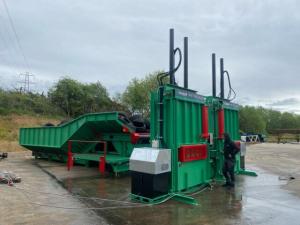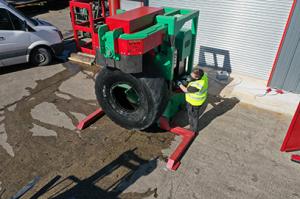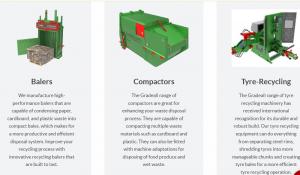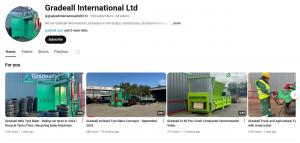How American Tariffs Are Hurting Manufacturing Businesses: The Gradeall Perspective
Northern Ireland manufacturer Gradeall reveals how unpredictable US tariffs are delaying customer purchases and threatening regional jobs.
When tariff uncertainty makes customers hesitant to invest, it affects not just our business, but the broader goal of improving waste management infrastructure across America.”
BELFAST, COUNTY ANTRIM, UNITED KINGDOM, August 3, 2025 /EINPresswire.com/ -- In the turbulent global trade landscape, manufacturing businesses across the UK and Northern Ireland are facing unprecedented challenges. For Gradeall International Ltd, a world-leading manufacturer of balers, compactors, and tyre recycling machinery based in Northern Ireland, the impact of recent American tariffs has been particularly acute. — Conor Murphy, Director, Gradeall International Ltd
Over the past six years, Gradeall has built strong relationships and a significant customer base in the United States, making the US market a vital component of its turnover. However, the unpredictable nature of US trade policy is now threatening the stability and growth of exporters like Gradeall, and by extension, the broader manufacturing sector.
The Reality of Tariff Uncertainty
One of the most damaging aspects of the current US tariff regime is not simply the rate of the tariffs themselves, but the uncertainty that surrounds them. The US government’s frequent and often abrupt changes to tariff policy have left both exporters and American importers in a state of flux. For Gradeall, this has translated into US customers delaying or postponing purchasing decisions, in the hope that tariffs might be reduced or removed in the near future.
This uncertainty is not just an inconvenience - it is a direct threat to business planning and investment. According to a recent survey, 61% of manufacturing businesses expect turnover to decrease as a result of ongoing US tariffs, with 55% anticipating lower profits by the end of the year. Such statistics highlight the widespread apprehension felt across the sector.
Inconsistent Tariff Application and Its Consequences
A particularly frustrating issue for Gradeall and its customers has been the inconsistent application of tariffs at different US ports. There have been documented cases where identical shipments of Gradeall machinery have attracted vastly different tariff rates - ranging from 10% to as high as 46% - depending on the port of entry, such as Savannah, Georgia versus Norfolk, Virginia. These discrepancies often arise from administrative errors or misinterpretation of customs documentation, but the end result is the same: confusion, extra costs, and a loss of confidence in the purchasing process.
This lack of clarity extends to the customs process itself. US customers are often left unsure of the exact amount they will be required to pay until their goods arrive at port, making it difficult to budget and plan for new equipment purchases. The administrative burden on both customers and suppliers is significant, with additional paperwork and communication required to resolve tariff disputes and navigate the customs maze.
The Hidden Cost: Demurrage Fees
Beyond the tariffs themselves, delays in customs processing can lead to substantial demurrage fees - charges incurred when containers are held at port beyond the agreed free period. Companies have experienced situations where customers faced significant demurrage costs simply because US customs were unable to process tariff payments quickly enough to release containers. In one instance, the company could not even pay the tariff because the designated bank account was not yet operational, compounding the delay and cost.
Demurrage and detention charges at US ports are among the highest in the world. Reports show that average demurrage fees can range from $50 to $250 per container per day, depending on the port and container size. These costs quickly add up, placing additional financial strain on customers and making Gradeall’s products less competitive in the US market.
Impact on Customer Relationships and Business Growth
The cumulative effect of these issues is a deterioration in the customer experience. For US buyers, the process of importing machinery from Northern Ireland has become fraught with uncertainty, extra costs, and administrative headaches. Many customers are now delaying or even abandoning planned purchases, waiting for greater clarity or hoping for a rollback of tariffs.
For Gradeall, this means not only a direct impact on sales and turnover, but also a significant diversion of resources towards helping customers navigate the new trade environment. Smaller manufacturers, in particular, struggle to absorb these additional costs and administrative burdens, putting them at a competitive disadvantage compared to larger firms.
The Broader Economic Picture
The challenges faced by Gradeall are emblematic of the wider difficulties confronting manufacturing exporters across the UK and Northern Ireland. Recent analysis by the Department for the Economy suggests that a 10% US tariff on UK goods could cost the Northern Ireland economy £85 million and lead to the loss of 800 jobs over the next 15 years. The machinery sector, in which Gradeall operates, is identified as particularly vulnerable to these trade barriers.
Moreover, the uncertainty created by the tariff regime is prompting many businesses to review their profit margins, scale back production, and reconsider investment plans. Nearly half (49%) of surveyed manufacturing firms are exploring entry into new markets or regions to reduce their dependence on US-linked trade. This shift not only threatens the growth prospects of individual companies, but also has potential knock-on effects for regional employment and economic output.
Gradeall: Leading Through Adversity
Despite these formidable challenges, Gradeall International Ltd continues to lead by example. With a reputation for innovation, durability, and customer service, Gradeall’s range of waste compaction and recycling equipment remains in high demand around the world. The company’s commitment to supporting its US customers - helping them navigate complex customs procedures, providing transparent pricing, and offering remote monitoring solutions - sets it apart as a market and industry leader.
Gradeall’s experience highlights the resilience and adaptability of Northern Ireland’s manufacturing sector. By maintaining close relationships with customers, investing in product development, and advocating for fairer trade practices, Gradeall is not only weathering the current storm but laying the groundwork for future growth.
The ongoing uncertainty and complexity of US tariffs are inflicting real and measurable harm on manufacturing businesses in Northern Ireland and beyond. From inconsistent tariff rates and mounting demurrage fees to delayed purchasing decisions and lost sales, the costs are both immediate and long-term. For Gradeall International Ltd, these challenges underscore the importance of clear, stable trade policies and the vital role of exporters in sustaining economic growth.
As policymakers on both sides of the Atlantic work towards a more predictable and equitable trading environment, Gradeall stands ready to continue serving its customers with the same commitment to quality and innovation that has made it a global leader in recycling machinery.
Gradeall's Product Range: Innovation Despite Trade Challenges
Despite facing significant trade barriers, Gradeall International Ltd continues to manufacture world-class recycling and waste management equipment that serves customers across five continents. The company's comprehensive product portfolio demonstrates the innovation and engineering excellence that Northern Ireland brings to global markets.
Leading Tyre Recycling Solutions
Gradeall's flagship products include the MK2 and MK3 Tyre Balers, which can process up to 6 PAS108-compliant bales per hour, reducing tyre volume by 80%. These machines have become essential equipment for recycling facilities across America, where approximately 280 million tyres reach end-of-life status annually.
The company's Truck Tyre Sidewall Cutter represents cutting-edge technology for processing large commercial tyres, whilst the OTR (Off-The-Road) Tyre Splitter tackles the massive tyres used in mining and construction industries. These specialised machines address critical waste management challenges in sectors vital to the US economy.
"Our OTR equipment processes tyres that can weigh up to 600kg each," explains Conor Murphy, Director at Gradeall International. "When mining companies in states like Nevada and Wyoming face delays and uncertainty over tariffs, it affects their ability to manage waste responsibly and plan for equipment replacement."
Comprehensive Waste Management Equipment
Beyond tyre recycling, Gradeall manufactures an extensive range of waste compactors and balers. The company's static compactors, including the G90 and G120 models, serve councils and large businesses across the UK and internationally. These machines reduce waste volume by up to 10:1, significantly lowering collection costs and environmental impact.
The portable compactor range, featuring models like the GPC-P24, provides flexible solutions for sites without permanent waste management infrastructure. These units have found particular success in American retail chains and municipal applications, where space constraints and operational flexibility are paramount.
Glass Processing Innovation
Gradeall's Large Glass Crusher represents another area of innovation, processing bottles and glass waste for hospitality and retail sectors. With growing emphasis on circular economy principles in both the UK and US markets, this equipment helps businesses convert waste glass into valuable aggregate material for construction applications.
Multi-Material Processing Solutions
The company's Multi-Materials Baler demonstrates Gradeall's adaptability to diverse waste streams. This versatile machine processes cardboard, plastic, textiles, and other materials, making it invaluable for businesses managing multiple waste types. The equipment's ability to create uniform, transportable bales has made it particularly popular with American logistics companies seeking to optimise their reverse supply chains.
The Engineering Excellence Behind Northern Ireland Manufacturing
Gradeall's success stems from decades of engineering expertise developed in Northern Ireland's manufacturing sector. The company's facility in Ballymena combines traditional engineering skills with modern manufacturing techniques, producing equipment that operates reliably in demanding industrial environments worldwide.
Each machine undergoes rigorous testing before shipment, ensuring compliance with international safety standards including CE marking for European markets and relevant US industrial standards. This attention to quality has earned Gradeall recognition as a preferred supplier to major corporations, municipalities, and recycling facilities across America.
"We've built our reputation on delivering equipment that works reliably for years, often in challenging conditions," notes Murphy. "When tariff uncertainty makes customers hesitant to invest, it affects not just our business, but the broader goal of improving waste management infrastructure."
Customer Impact: Real Consequences of Trade Uncertainty
The tariff situation has created tangible problems for Gradeall's American customers. A recycling facility in Texas recently postponed purchasing a £75,000 tyre baler system due to uncertainty over final import costs. Similarly, a municipal customer in California delayed replacing ageing compactor equipment, concerned about budget implications of fluctuating tariffs.
These delays have cascading effects beyond individual purchases. Recycling facilities operating with older, less efficient equipment process fewer materials and require more frequent maintenance. Municipal waste management operations face higher costs and reduced service quality when equipment replacement is deferred.
Industry-Wide Implications
Gradeall's experience reflects broader challenges facing the UK's machinery export sector. The Association of British Machine Tool Companies reports that 73% of members have experienced delayed orders from US customers since the implementation of recent tariff measures.
For the recycling industry specifically, these trade barriers come at a critical time. The US generates over 1 billion waste tyres annually, requiring efficient processing equipment to prevent environmental hazards and recover valuable materials. When trade uncertainty delays equipment purchases, it ultimately affects America's ability to manage this waste stream effectively.
Supporting the Circular Economy
Despite trade challenges, Gradeall remains committed to supporting the global transition towards circular economy principles. The company's equipment enables businesses to convert waste into valuable resources: shredded rubber for playground surfaces, steel wire for construction, and baled materials for efficient transport and processing.
This alignment with environmental goals makes the current trade situation particularly frustrating. At a time when both the UK and US are emphasising sustainability and waste reduction, trade barriers are hindering the deployment of equipment specifically designed to address these challenges.
Regional Economic Impact
In Northern Ireland, Gradeall directly employs skilled engineers, technicians, and support staff. The company's success supports additional employment in the regional supply chain, from steel suppliers to transport providers. Recent economic analysis suggests that each manufacturing job in Northern Ireland supports approximately 2.5 additional positions in the broader economy.
When US market uncertainty forces companies like Gradeall to scale back expansion plans or delay investment, the effects ripple through the entire regional economy. Local suppliers face reduced orders, while skilled workers may consider opportunities elsewhere, potentially weakening the manufacturing base that Northern Ireland has worked decades to develop.
Looking Forward: Adaptation and Resilience
Despite current challenges, Gradeall continues investing in product development and customer service. The company has enhanced its remote monitoring capabilities, allowing customers to track equipment performance and schedule maintenance more efficiently. This technology-driven approach helps customers maximise return on investment, partially offsetting the additional costs imposed by tariffs.
Gradeall is also expanding its presence in alternative markets, including Europe, Asia, and the Middle East. However, these efforts cannot fully compensate for the scale and established relationships of the US market.
"We've spent years building trust with American customers," explains Murphy. "When trade uncertainty makes them hesitant to buy, we're not just losing sales – we're seeing relationships built over decades come under strain through no fault of either party."
The company's experience demonstrates both the vulnerability and resilience of Northern Ireland's manufacturing sector. Whilst current trade conditions pose significant challenges, Gradeall's continued innovation and customer focus position it well for long-term success once greater trade stability returns.
As businesses on both sides of the Atlantic navigate this uncertain environment, Gradeall International Ltd remains committed to delivering the high-quality equipment that supports environmental goals and economic growth, hoping for the return of predictable trade relationships that benefit manufacturers, customers, and the broader economy alike.
Conor Murphy
Gradeall International Limited
email us here
Visit us on social media:
LinkedIn
Facebook
YouTube
X
Gradeall OTR TYRE Splitter on Polyurethane/Foam filled tyres
Legal Disclaimer:
EIN Presswire provides this news content "as is" without warranty of any kind. We do not accept any responsibility or liability for the accuracy, content, images, videos, licenses, completeness, legality, or reliability of the information contained in this article. If you have any complaints or copyright issues related to this article, kindly contact the author above.





